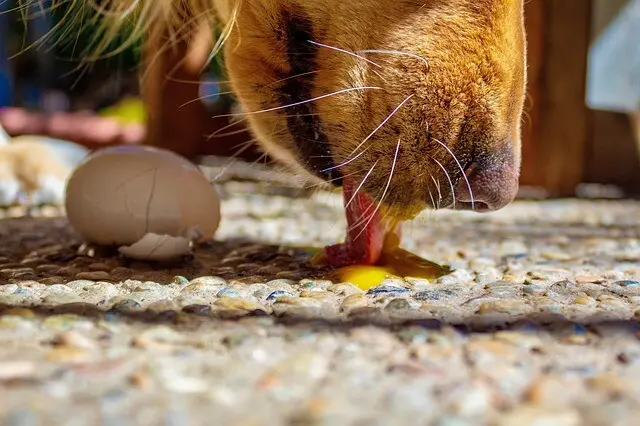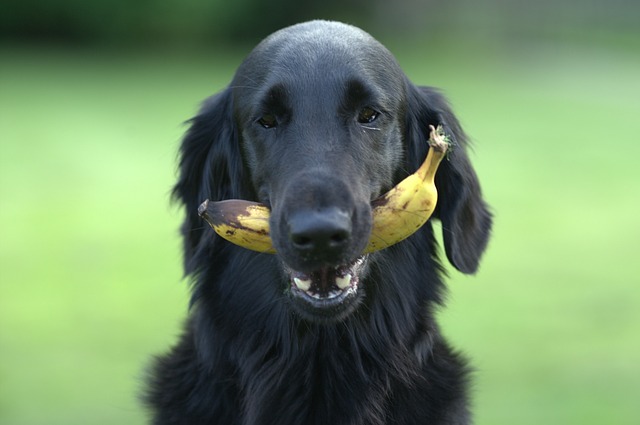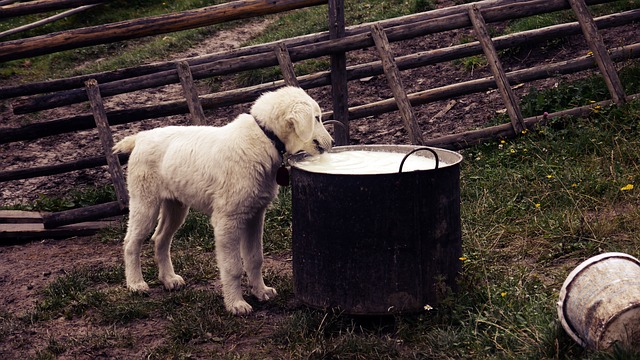
Who hasn’t experienced this? When eating together, the family dog sits expectantly next to the table and looks at its owners with wide eyes. Many dog owners willingly share their food with their four-legged friends. However, some types of fruit and vegetables are not digestible for dogs. Other foods such as chocolate can even cause poisoning. This guide lists which foods dogs are not allowed to eat.
How do you feed your dog properly?
Dog nutrition is an important aspect of their health and well-being. Proper nutrition depends on several factors, including the dog’s age, breed, size, activity level and any health problems. Here are some basic principles of dog nutrition:
How do you recognize high-quality dog food?
Dogs should primarily high-quality dog food that is specifically formulated for their needs. This can be dry food, wet food or a mixture of both. How do you recognize a high-quality food?
The right mix of proteins, fats and carbohydrates
Dogs are carnivores , so it is important to provide them with adequate protein. Meat, fish and poultry are excellent sources of protein. Make sure the dog food contains at least 18-25% protein.
Fats provide energy and are important for skin and coat health. About 10-15% fat in the diet is appropriate. Carbohydrates can be part of the diet, but should be given in moderation. Dogs can get carbohydrates from rice, oatmeal and vegetables.
Sufficient water, vitamins and minerals
A balanced diet should contain all the necessary vitamins and minerals. Special dog foods are often formulated with balance in mind. In addition to providing nutrients, drinking enough is also important (especially if your dog prefers dry food). Make sure your dog always has access to fresh water.
Avoid being overweight
It is important to control the portions: the amount of food depends on the size, activity level and age of the dog. Follow the instructions on the food packaging or consult your veterinarian to determine the right portion size. Be careful when giving snacks and treats, as excessive rewards can lead to obesity . Joint problems or diabetes can be the result.
It is important to note that every dog’s needs are unique, so always consult your veterinary practice to develop the best nutritional strategy for your dog and ensure he is getting the right nutrients.
Food poisoning: Dangers for dogs lurk everywhere
Whether it’s food that is pushed to the dog at the table, food that the dog steals from the kitchen or food that is found outside – all of this can become a life-threatening trap for the dog. Dog owners should therefore always keep an eye on their dog outside and practice only accepting food from their owner. You should also tell guests that the dog is not allowed to eat everything and that dangerous food should be stored safely.
In the following section, you will learn more about the foods that your dog can safely eat.
Vegetables and fruits for dogs – which varieties are digestible
The dog is a carnivore by nature. But not exclusively. Its wild relatives, the wolves, consume fruit and vegetables from their prey that are in the stomachs of the animals they catch. Anyone who feeds their dog fresh meat should therefore also feed fruit and vegetables. This way, owners can ensure that the dog is supplied with all the important nutrients .
Can dogs eat tangerines and watermelon?
Tangerines are one of the most popular citrus fruits during the Christmas season. Small amounts are easily digestible for dogs . In addition to vitamin C, they also contain provitamin A, which can have a positive effect on the skin and eyes.
Dogs can eat watermelon in moderation as it is a safe and refreshing treat. Watermelon is about 90% water and contains many vitamins and antioxidants that can be healthy for dogs. Watermelon is a great choice to cool down and provide your dog with extra fluids on hot days.
Peppers, peas and zucchini are fine
Like other nightshades, peppers contain solanine, which is toxic to dogs. Despite this, dogs can tolerate small amounts of red and yellow peppers . Only green peppers should not end up in the dog’s bowl. The peppers should be removed from the stalk and cooked before feeding. They should not be on the menu more than once a week.
Peas are a source of fiber, protein and vitamins and can be a healthy addition to a dog’s diet. They are also included as an ingredient in many commercial dog foods. Zucchinis are one of the healthiest vegetables for dogs and are also a source of vitamin B6 and vitamin A. They can be fed without any problems, but care must be taken not to swallow any pieces of zucchini.
Just like the peppers mentioned above, tomatoes belong to the nightshade family. Green tomatoes should not be fed due to their high solanine content. The stalk should also be removed to avoid diarrhea and vomiting. The riper the tomato, the less solanine it contains. Dog owners should therefore use overripe tomatoes and not feed them more than once a week. In addition, only small amounts should be fed.
Table: Which vegetables and fruits can dogs eat?

| Vegetables | Fruit |
| artichokes | pineapple |
| leaf lettuce | apples |
| Cauliflower (boiled or steamed) | apricots (without pit) |
| Chinese cabbage | bananas |
| Chicory | pears |
| broccoli (cooked) | blackberries |
| peas (small amounts, cooked) | cranberries |
| fennel | dates |
| cucumbers | strawberries |
| carrots | figs |
| potatoes (boiled and peeled) | pomegranate |
| kohlrabi | blueberries |
| pumpkin | raspberries |
| corn (cooked) | currants |
| parsnips | persimmon |
| Beetroot | cherries (without pits) |
| arugula | kiwi |
| asparagus (cooked) | mango |
| spinach | melon |
| sweet potato | nectarines |
| tomatoes (without stem) | papaya |
| Jerusalem artichoke | plums (pitted) |
| zucchini | pomelo |
| gooseberries | |
| lemons |

There are various types of fruit and vegetables that are digestible for dogs. Some fruits are not poisonous, but can have a negative effect on the digestive system . It is therefore a good idea to introduce the dog to new fruits and vegetables carefully and observe the reaction.
Protect yourself from high veterinary costs as a result of treating poisoning by health insurance for your dog complete.
Which carbohydrates should dogs eat?
Dogs can have carbohydrates in their diet, but they should come from easily digestible and healthy sources.
Suitable Carbohydrate Sources for Dogs
- Grains: Grains such as rice, oats and barley can be well tolerated by many dogs. These grains provide energy and fiber.
- Vegetables: Various vegetables such as carrots, sweet potatoes, pumpkin, peas and green beans are an excellent source of fiber and vitamins. They can be served raw or cooked.
- Legumes: Some dogs tolerate legumes such as lentils or beans well. These also provide fiber and protein.
- Fruits: Some fruits like apples and blueberries can be given in small amounts as a treat. They are rich in vitamins and antioxidants.
It is important to note that carbohydrates should not be the main component of a dog’s diet. Dogs are carnivores and animal proteins are vital to their diet. Carbohydrates should be used as a supplement and should not be excessive in the diet.
Can dogs eat potatoes?
Another vegetable from the nightshade family is the potato. Just like peppers and tomatoes, potatoes can be fed to your dog under certain conditions. If you want to feed potatoes to your dog, you should follow these
Many dog foods contain grains. Not every dog can tolerate this. Boiled and peeled potatoes are a good alternative. Crushed potatoes can also help with stomach and intestinal problems.
What foods should dogs avoid?
Who hasn’t experienced it? When eating together, the family dog sits expectantly next to the table and looks at its owners with wide eyes. Many dog owners willingly share their food with their four-legged friends. However, some types of fruit and vegetables are not digestible for dogs. Other foods such as chocolate can even poisoning This guide lists which foods dogs should not eat.
No chips – little salt is good for your health
Dogs require salt in their diet as it is a vital mineral required for the functioning of their bodies. Salt helps maintain water and electrolyte balance in the body. Most commercial dog foods contain the required amount of salt.
However, it is important to note that too much salt can be harmful. Excessive salt intake can lead to dehydration , kidney problems and other health issues, so it is advisable to control your dog’s salt intake and ensure that it is within the recommended range.
Dogs should not have access to highly salted human foods as these are not suitable for them, so avoid feeding them salty snacks, salted meats or foods that are high in sodium.
Can dogs eat onions?
Onions should never be fed to dogs . They contain the active ingredients N-propyl disulfide and allylpropyl sulfide. Both are harmful to the dog’s organism because they destroy the hemoglobin in the four-legged friend’s red blood cells. This can lead to anemia, which causes organ failure.
Warning:
Just four to five grams of onions per kilogram of the dog’s body weight can be poisonous . This applies to raw, cooked and fried onions.
Are nuts poisonous to dogs?
Some types of nuts, such as macadamia nuts, are poisonous for dogs. Nuts are also very high in calories and contain a lot of fat. Therefore, even nut types that are easily digestible, such as hazelnuts or almonds, should only be fed to dogs on rare occasions. Peanuts are not poisonous for healthy dogs. However, if a dog suffers from heart or kidney problems, peanuts are strictly prohibited.
Tip: It is useful to have a list on the fridge with the heading: What are dogs not allowed to eat? This makes it easier to keep track of all the foods that are not digestible for your four-legged friend.
Avoid pomegranates
Pomegranates are potentially toxic to dogs and should be handled with caution. Both the seeds and the skin of the pomegranate can be difficult for dogs to digest and cause digestive problems. The seeds are particularly problematic because they contain small, hard seeds that can be dangerous for dogs if swallowed.
Pomegranate juice is less dangerous, but it usually contains a lot of sugar and should only be given in very small amounts and as an occasional snack. Too much sugar can lead to obesity and other health problems in dogs.
If you want to give your dog a piece of a pomegranate, you should carefully remove the seeds and offer only a very small amount of pulp or juice. Remember to monitor your dog’s reaction and look for signs of gastrointestinal problems. If your dog is sensitive to pomegranate or shows signs of discomfort, you should stop giving him this fruit.
As a general rule, it is always best to stick to safer and more dog-friendly treats and snacks that are made specifically for dogs to ensure their health and safety.
Dogs and dairy products
Many adult dogs are lactose intolerant . This means that they react with diarrhea and vomiting if they consume too much milk sugar, i.e. lactose. However, not all dairy products contain the same amount of milk sugar. Some are suitable as a supplement in the dog’s bowl. These include:
- cottage cheese
- quark
- yogurt (unsweetened)
- buttermilk
Can dogs drink milk?

Milk contains important proteins and vitamins that are healthy not only for humans but also for dogs. Milk is not poisonous per se, but can lead to diarrhea and vomiting, especially if the dog is not used to milk. If dog owners want to give their dog milk to drink, they should use lactose-free milk . In principle, dogs do not need milk for a balanced diet.
Can dogs eat cheese?
Some types of cheese, such as hard cheese, contain little lactose and can therefore be fed as a treat from time to time. In addition, some types of semi-hard cheese, such as Gouda or Edam, are digestible for most dogs. Other types of cheese, especially blue cheese such as Roquefort or Gorgonzola, trigger a toxic reaction in dogs .
Processed cheese also does not belong in the dog’s bowl. Not only does it contain too much salt, but it is also full of phosphates and additives that can be unhealthy for dogs. The edges of cheese wheels are also not recommended for dogs, as they are often treated with wax or plastic.